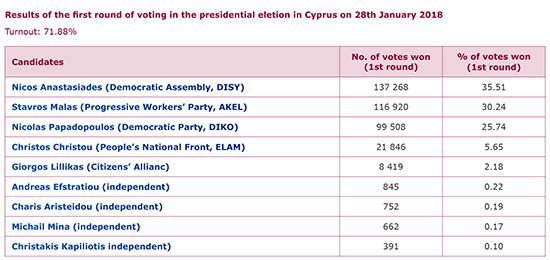Results
Elections in Europe
Corinne Deloy
-

Available versions :
EN

Corinne Deloy
Outgoing head of State Nicos Anastasiades (Democratic Assembly, DISY) drew ahead in the first round of the presidential election organised in Cyprus on 28th January. He won 35.51% of the vote and took the lead over Stavros Malas, who is standing as an independent, but who is supported by the Progressive Workers' Party (AKEL), winning 30.24% of the vote. The two men, who were already finalists in the last presidential election on 17th and 24th February 2013, will face each other therefore in the second round of voting on 4th February.
The gap between the two candidates is less than announced in the polls.
Coming third with 25.74% of the vote Nicolas Papadopoulos (Democratic Party DIKO) finds himself in the position of kingmaker.
Christos Christou, the leader of the far right party People's National Front (ELAM) won 5.65% of the vote and Giorgos Lillikas (Citizens' Alliance) won 2.18%. The other four candidates won under 1% of the vote each.
Turnout totalled 71.88%, a sharp decrease in comparison with the figure recorded in the first round of the previous presidential election on 17th February 2013: 11.26 points. It is obligatory to vote in Cyprus.
Socio-economic issues dominated the electoral campaign, relegating the question of the island's reunification to second place. Negotiations over this have been at a standstill since 6th July last, since neither side has succeeded in agreeing over the status of the Turkish forces present on the island, with Ankara refusing to relinquish its right to intervention. "The problem with the reunification of Cyprus is no longer high on the agenda because voters are tired and are no longer expecting the two sides to come to rapid agreement," indicated Harris Papageorgiou, director of the research centre Noverna.
"The choice has never been as simple. Either we opt for a future in which things are made possible or we choose a movement that caused the bankruptcy of our country. Either we are going to move forward, or we shall return towards the insecurity of the previous government. On Sunday next we are being called to choose a path of stability, which attracts investments, and creates jobs," indicated Nicos Anastasiades after the announcement of the results.
From an economic point of view the outgoing President of the Republic is standing as the saviour of the Cypriot economy and the guarantor of the country's economic stability. If he is re-elected he has promised to introduce a fund to help pay back some of his fellow countrymen's savings that were seized in 2013.
"The people have spoken, a new majority has expressed its desire for change," maintained Stavros Malas. "The re-election of Nicos Anastasiades as President of the Republic would be synonymous to continuity in terms of the economic policy. Stavros Malas has undertaken an extremely careful campaign and has avoided making too many promises. However, the real question is whether he can manage his relations with the Progressive Workers' Party," wonders Sofronis Clerides, professor in Economics at the University of Cyprus.
The People's National Front, whose leader, Christos Christou came fourth said he would soon be sending out a questionnaire to each of the two candidates qualified for the second round of voting before deciding which one he will support on 4th February next.
On the same theme
To go further
Elections in Europe
Corinne Deloy
—
25 February 2025
Elections in Europe
Corinne Deloy
—
18 February 2025
Elections in Europe
Corinne Deloy
—
28 January 2025
Elections in Europe
Corinne Deloy
—
14 January 2025

The Letter
Schuman
European news of the week
Unique in its genre, with its 200,000 subscribers and its editions in 6 languages (French, English, German, Spanish, Polish and Ukrainian), it has brought to you, for 15 years, a summary of European news, more needed now than ever
Versions :




